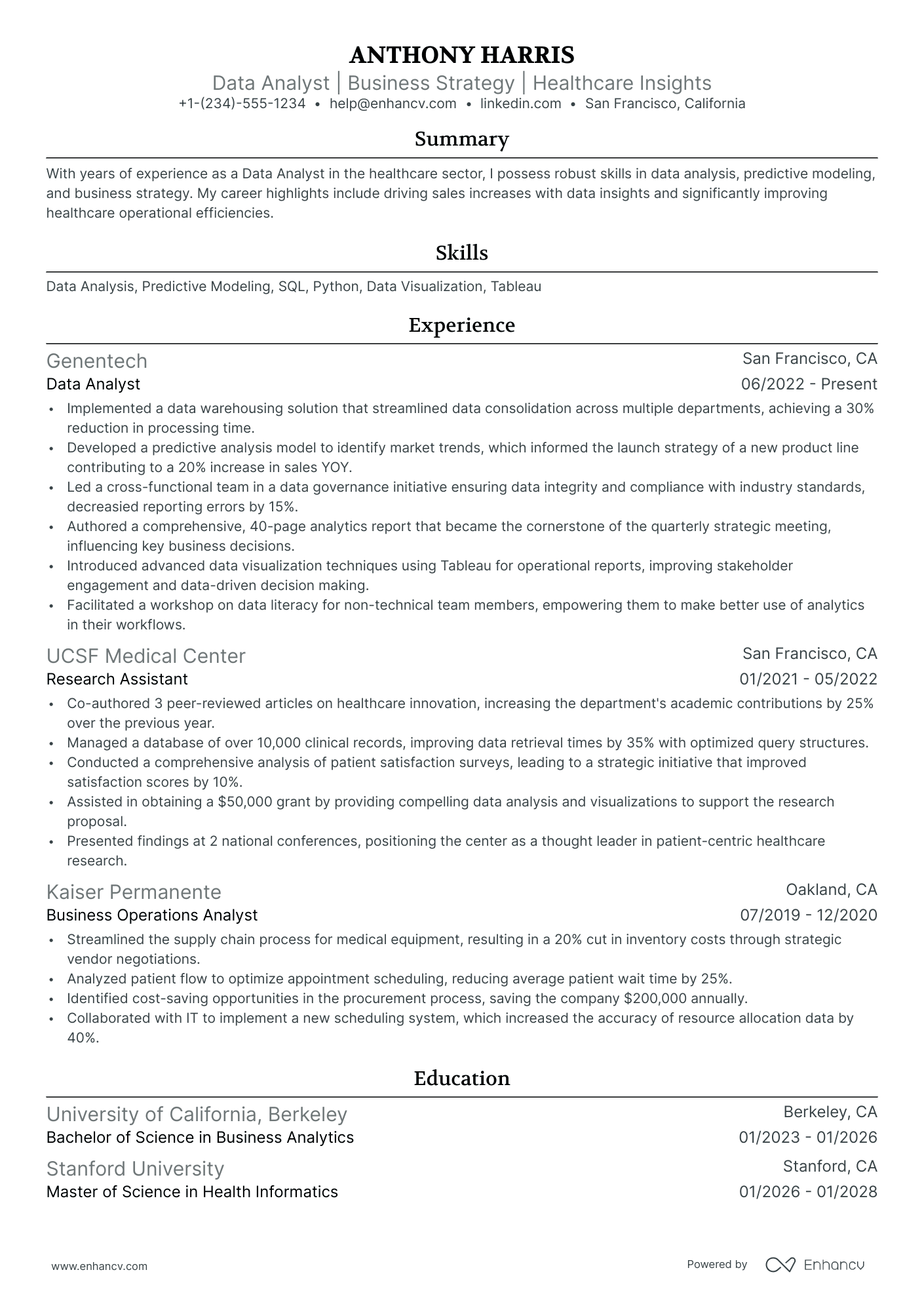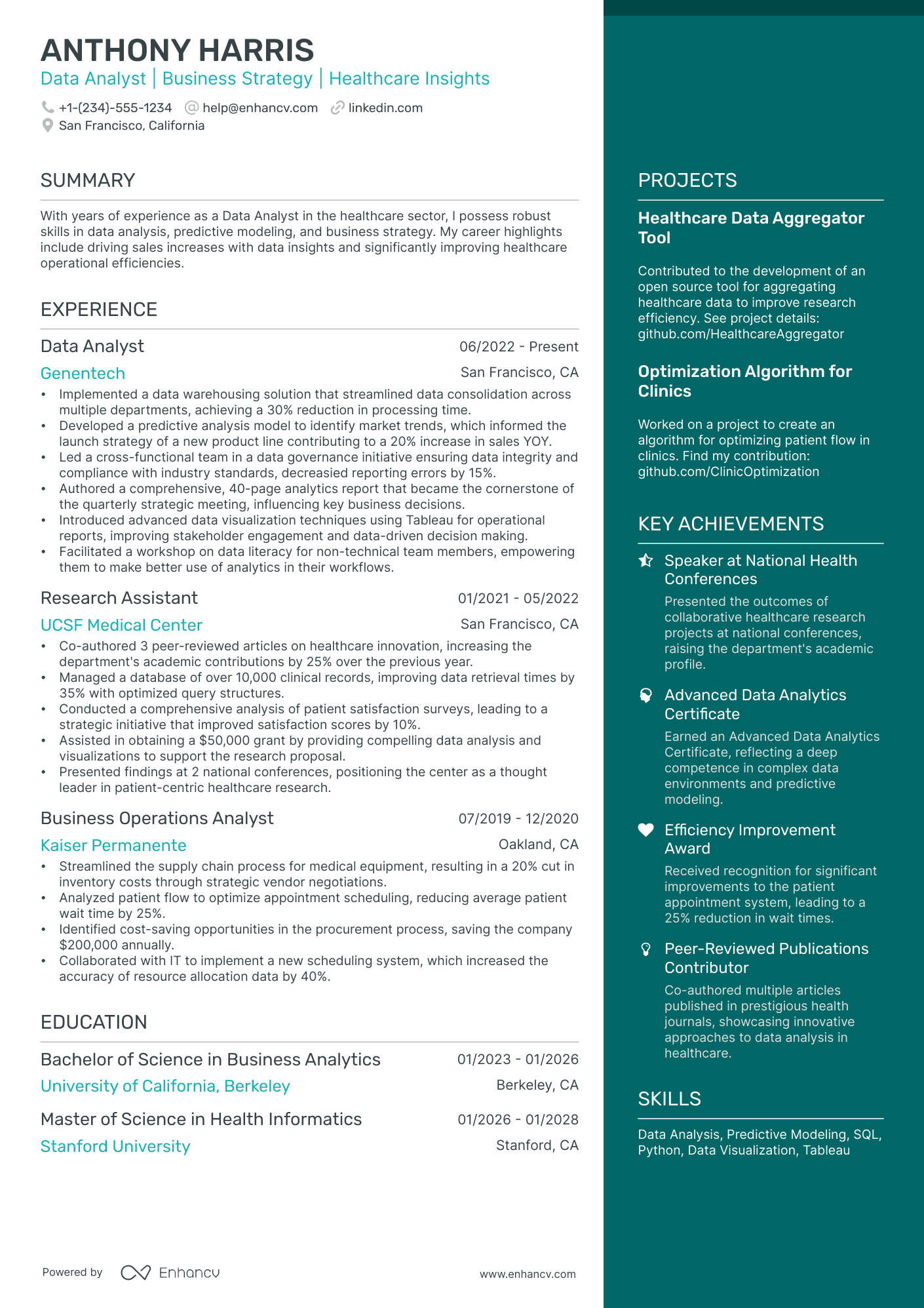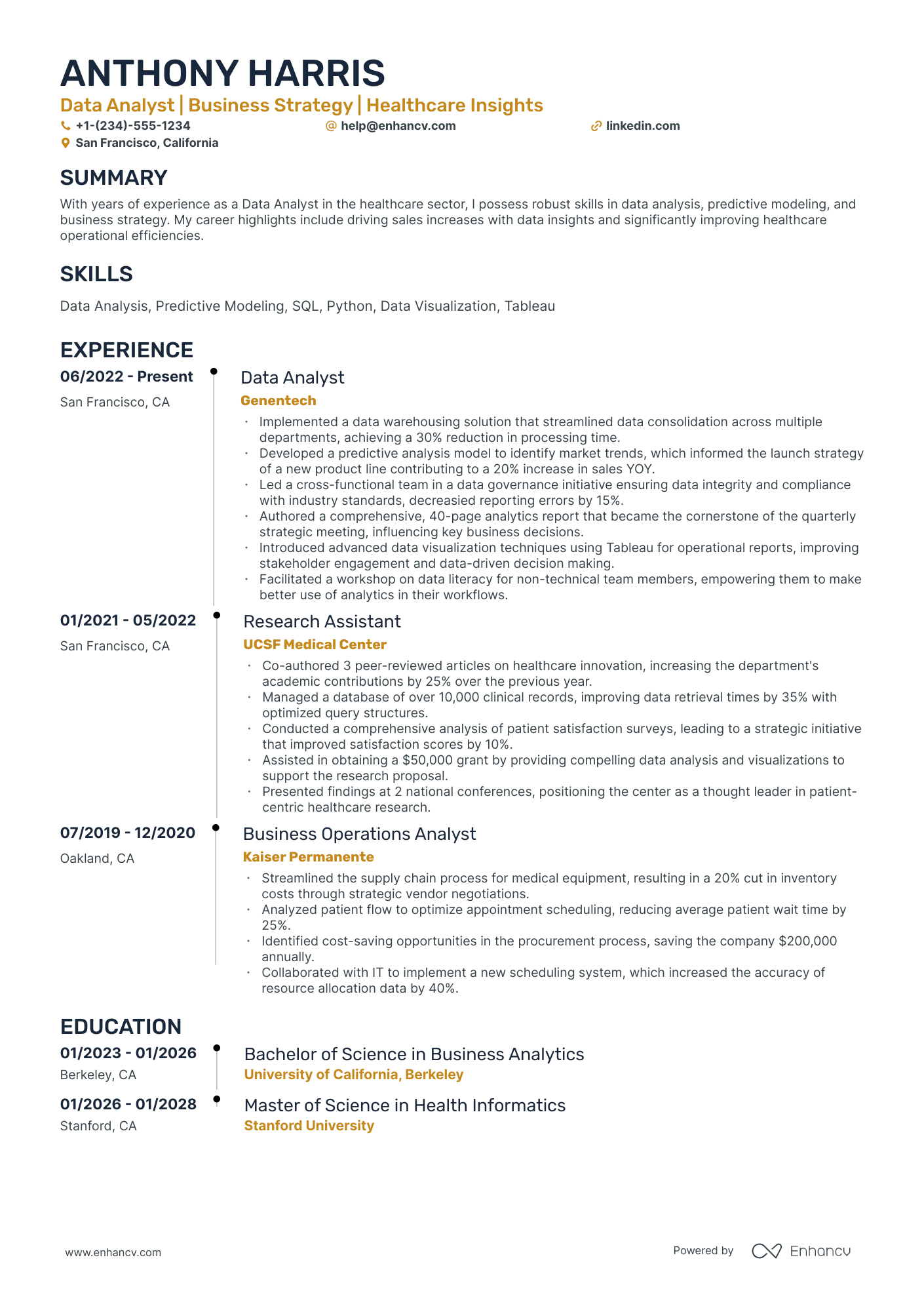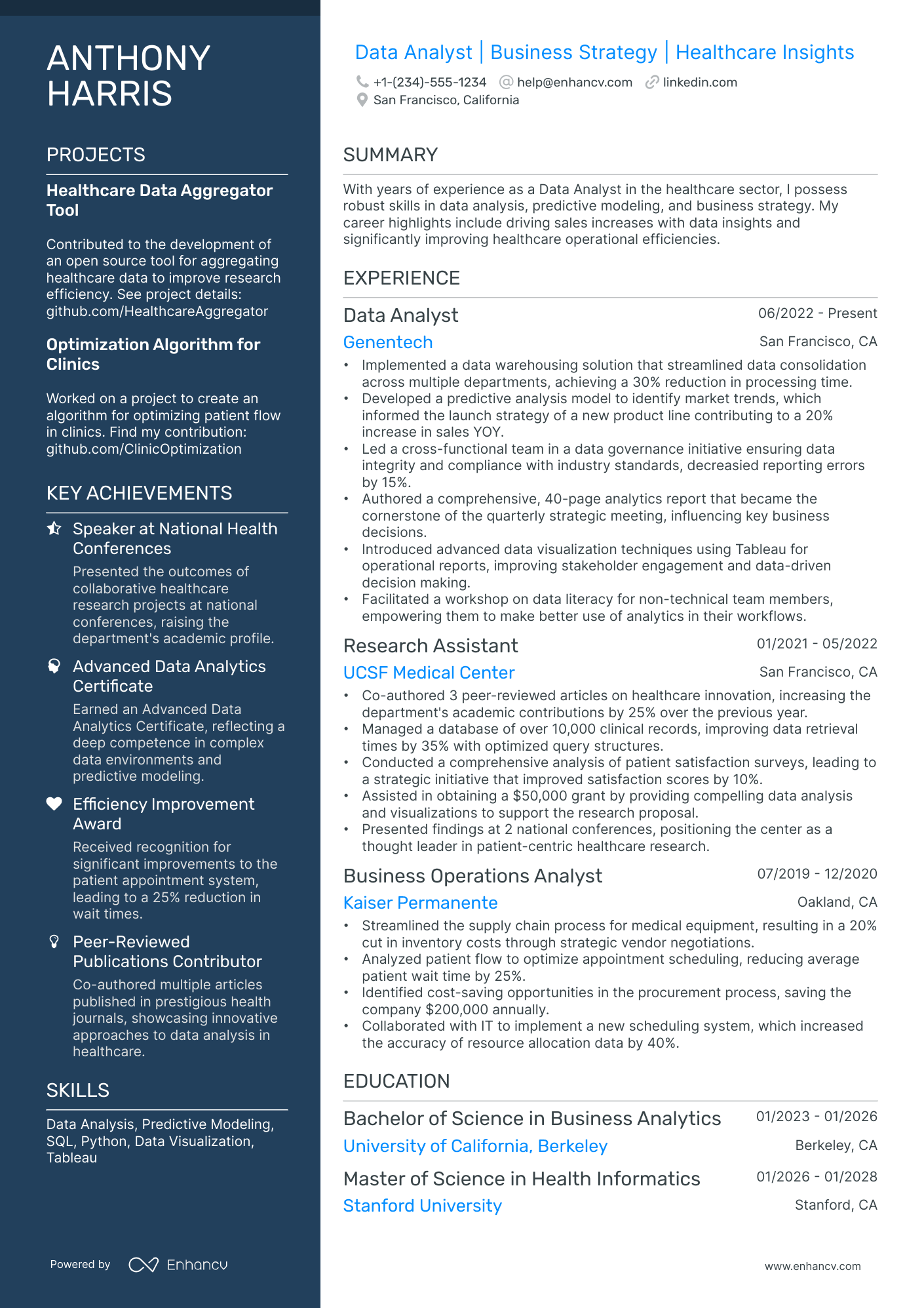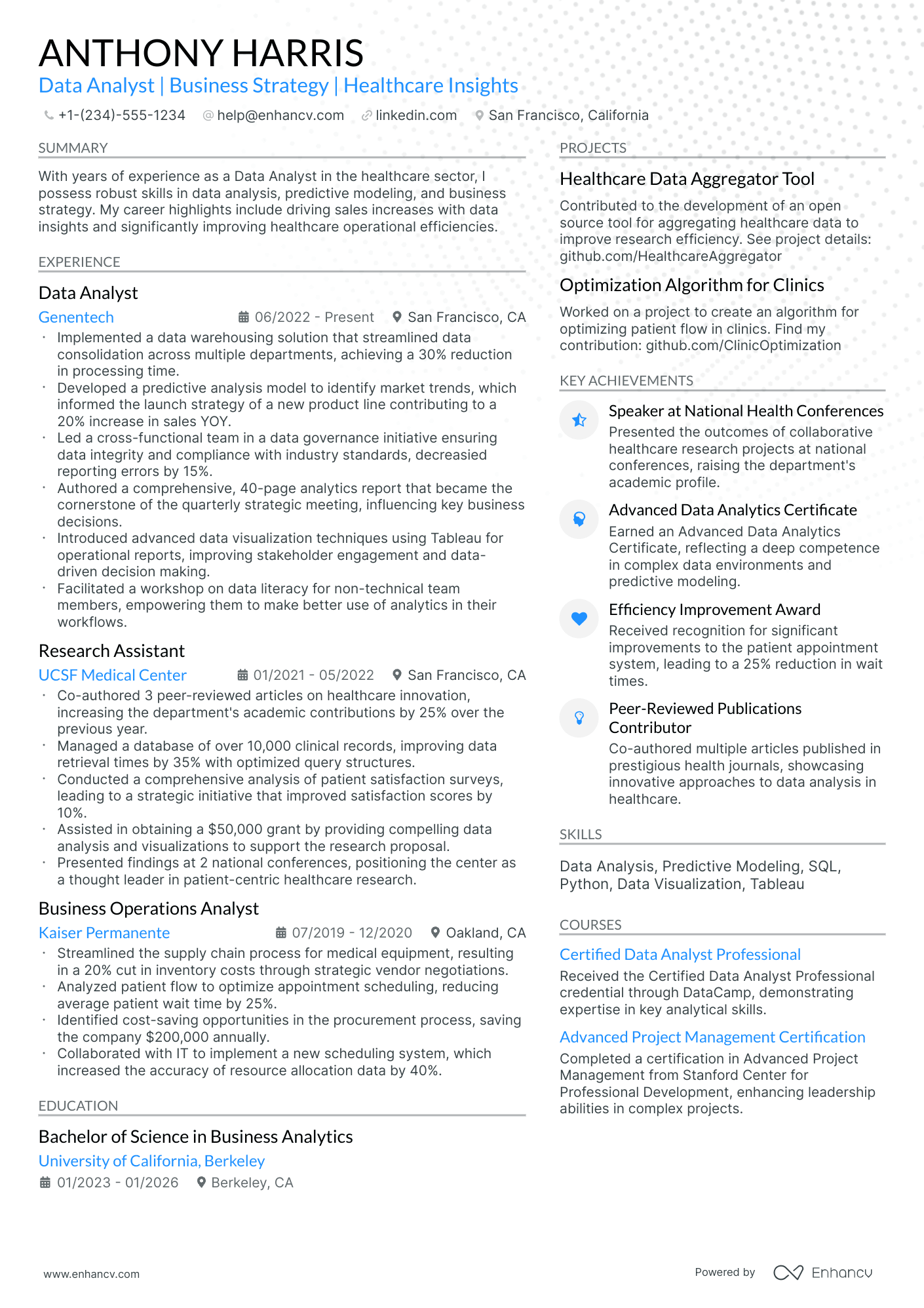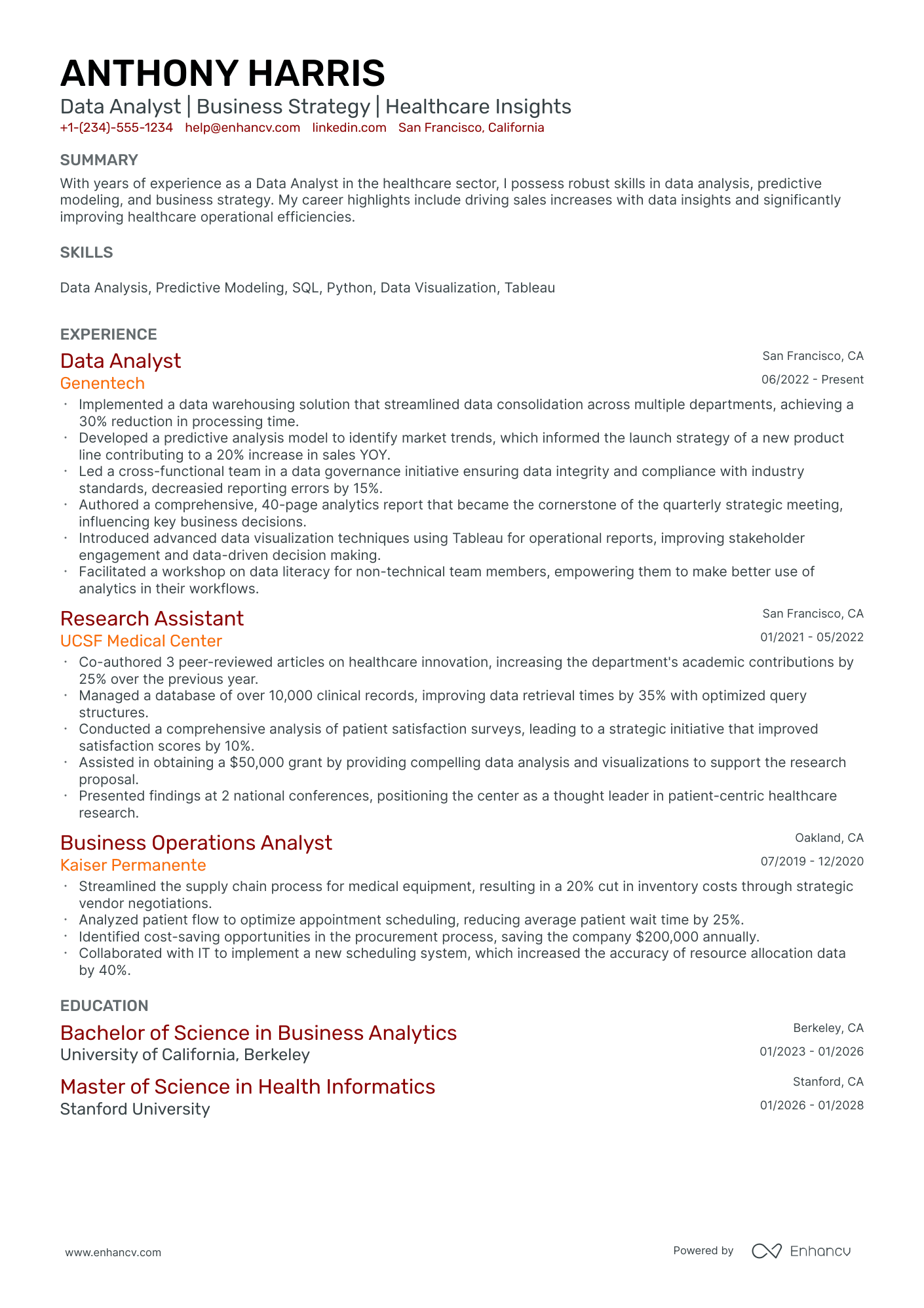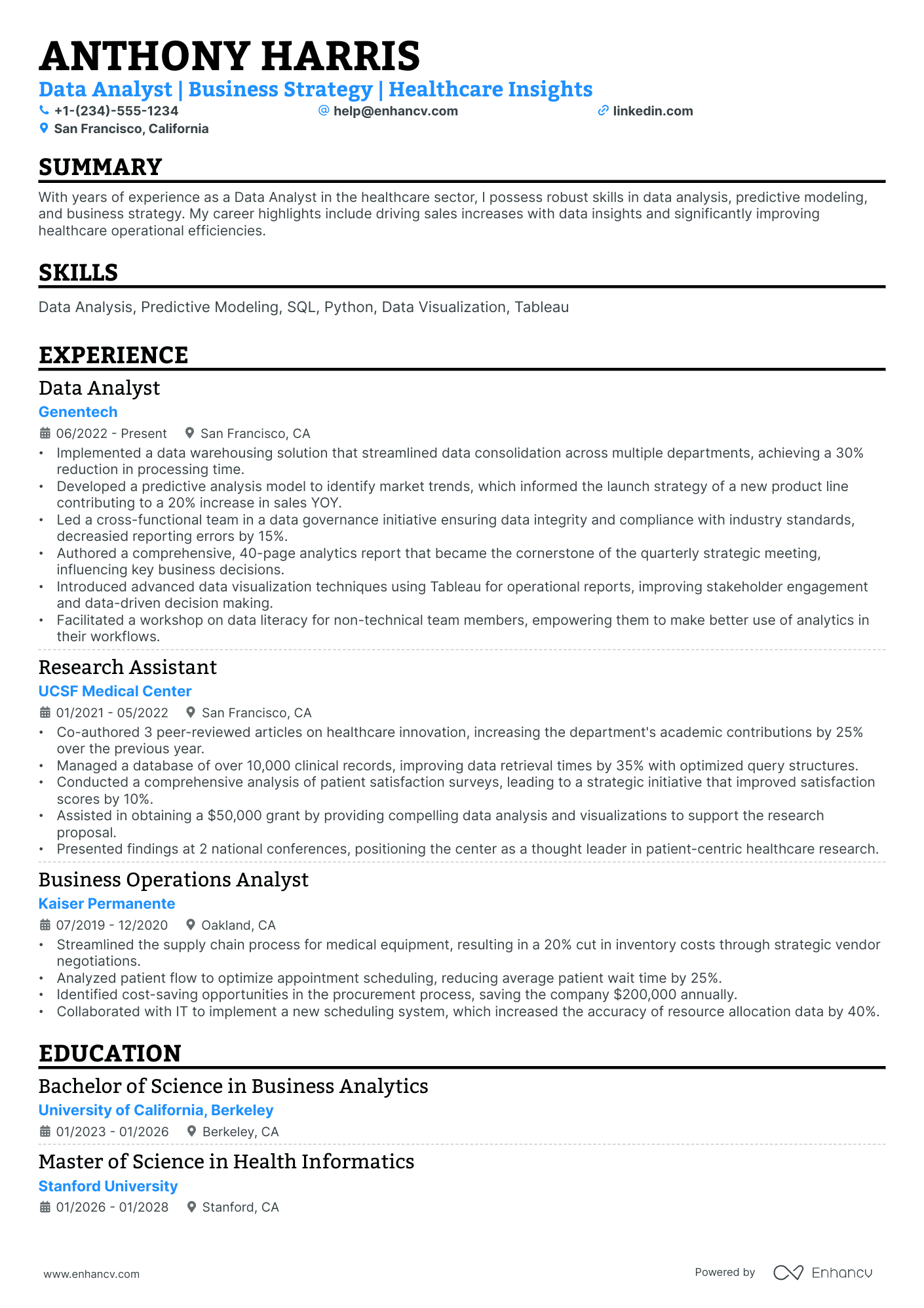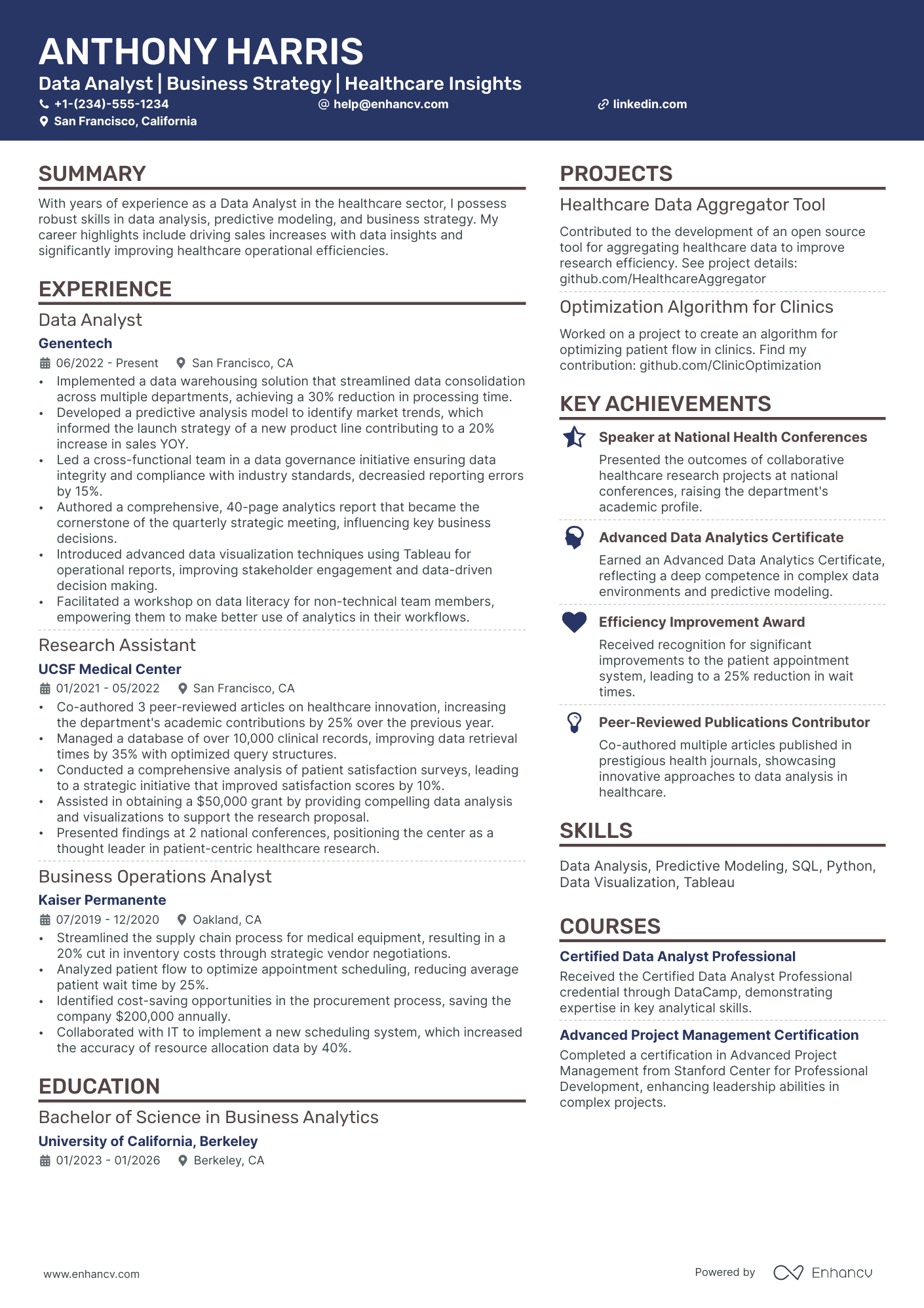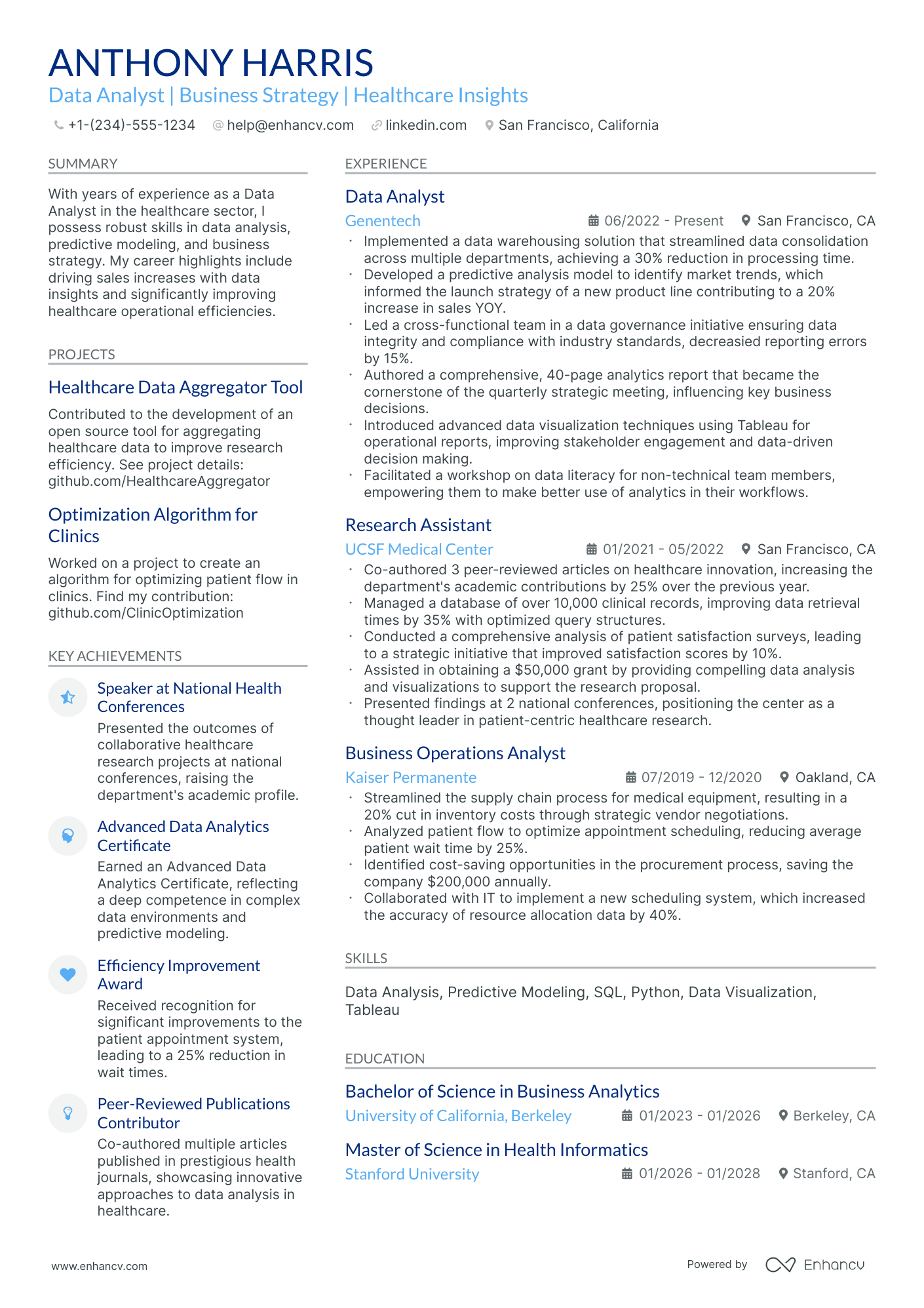As a sophomore engineering student, you may struggle with presenting substantial work experience on your resume. Our guide provides strategies to emphasize your academic projects, relevant coursework, and extracurricular involvement to create an impactful resume that resonates with employers.
- Sample industry-leading examples to learn how to write your best resume yet.
- Improve the experience, education, and achievements section of your resume with insights from resume-writing professionals.
- Curate your technical expertise and personality to stand out amongst the pool of candidates.
- Succinctly focus on your unique skill set all through your sophomore engineering resume.
If the sophomore engineering resume isn't the right one for you, take a look at other related guides we have:
- QA Automation Resume Example
- IT Operations Manager Resume Example
- Software Engineer Intern Resume Example
- IT Service Manager Resume Example
- IT Support Manager Resume Example
- Assistant IT Manager Resume Example
- Voip Network Engineer Resume Example
- Cisco Network Engineer Resume Example
- SAS Clinical Programmer Resume Example
- Engineering Student Resume Example
Simple guide to your sophomore engineering resume format and layout
Successful sophomore engineering resumes all have one specific characteristic - candidates have invested in a simple resume layout . One that is easy to read, makes a good first impression, and is adapted to their professional experience. There are three distinct resume formats to help you focus on your:- professional experience - use the reverse-chronological resume format;
- skills and achievements - via the functional skill-based resume format;
- both experience and skills - with a hybrid resume format .
What is more, keep in mind that your resume may be initially assessed by the ATS (Applicant Tracker System) (or the software used by companies in the hiring process). The sophomore engineering resumes that suit the ATS:
- have a header that includes either a role keyword or the job you're applying for;
- should be no longer than two pages;
- be submitted as PDF, unless specified otherwise.
Upload & Check Your Resume
Drop your resume here or choose a file. PDF & DOCX only. Max 2MB file size.
PRO TIP
List all your relevant higher education degrees within your resume in reverse chronological order (starting with the latest). There are cases when your PhD in a particular field could help you stand apart from other candidates.
The six in-demand sections for your sophomore engineering resume:
- Top one-third should be filled with a header, listing your contact details, and with a summary or objective, briefly highlighting your professional accolades
- Experience section, detailing how particular jobs have helped your professional growth
- Notable achievements that tie in your hard or soft skills with tangible outcomes
- Popular industry certificates to further highlight your technical knowledge or people capabilities
- Education to showcase your academic background in the field
What recruiters want to see on your resume:
- Relevant technical skills (e.g., CAD software, programming languages, lab equipment familiarity).
- Engineering projects and coursework (actions taken, results, and technologies used).
- Internship experience or industry exposure (companies worked for and engineering tasks performed).
- Problem-solving abilities and engineering design process experience.
- Professional affiliations and certifications (e.g., EIT certification, membership in engineering societies).
Defining your professional expertise in your sophomore engineering resume work experience section
The work experience section, often the most detailed part of your resume, is where you discuss your past roles and achievements. To effectively list your experience, consider these four key tips:
- Align your expertise with the job requirements. It's vital to integrate keywords matching the job criteria to pass initial assessments;
- Show, don’t just tell. Quantify your responsibilities by stating your actual achievements in previous roles;
- Include measurable metrics. For instance, how did your performance impact the annual ROI?
- Highlight crucial industry skills. Mention both technological knowledge and interpersonal skills in this section.
These guidelines will help you craft an impressive sophomore engineering resume work experience section that is bound to catch recruiters' attention.
- Actively participated in the design and optimization of an innovative heat exchanger for automotive applications, achieving a 10% improvement in thermal efficiency.
- Coordinated with a team of 4 engineers in the simulation and analysis of structural components using Finite Element Analysis, which reduced materials cost by 15%.
- Implemented a lean manufacturing initiative for the production line of hydraulic pumps, leading to a 20% increase in output and a decrease in assembly time.
- Assisted in developing a solar-powered irrigation system prototype, which conserved 30% more water than traditional systems for rural deployments.
- Compiled and analyzed performance data from wind turbine field tests, contributing to a report that influenced the future design direction.
- Engaged in weekly brainstorming sessions that led to a patent filing for a novel water filtration system designed for low-income regions.
- Designed custom circuit boards for commercial LED lighting systems, which increased energy efficiency by 25% over previous models.
- Led the debugging and validation of electronic components in the new product line, directly improving product reliability by 30%.
- Mentored by senior engineers to master the use of CAD software for 3D modeling of electrical enclosures and heat sinks.
- Assisted in the research and application of bio-mimetic materials in aerospace designs, yielding a prototype with enhanced aerodynamic properties.
- Contributed to the preparation of technical documentation and grant proposals that secured $500,000 in research funding.
- Participated in cross-departmental meetings to discuss the scalability of nanotechnology applications within the aerospace industry.
- Played a key role in the software engineering team that developed a new machine learning algorithm for predictive maintenance, reducing machine downtime by 40%.
- Contributed to writing and maintaining code for the company's main product suite, ensuring compatibility with the latest operating systems.
- Assisted in quality assurance testing, leading to a 15% decrease in software bugs reported by end-users.
- Supported the materials engineering group in developing a new composite material that was 30% lighter and yet 25% stronger than traditional materials used in the field.
- Conducted rigorous stress testing on various materials in lab settings, deriving insights that guided the design process for high-impact applications.
- Collaborated with supply chain partners to streamline the material procurement process, significantly reducing lead times by 3 weeks on average.
- Engaged in the development of an autonomous robotic system, enhancing operational accuracy by 20% through iterative design and testing.
- Supported senior robotics engineers in troubleshooting hardware issues during field trials, ensuring timely adherence to project milestones.
- Facilitated workshops on robotics fundamentals for new interns, fostering a culture of learning and knowledge sharing within the company.
- Contributed to the design and pilot production of a new water treatment device, directly resulting in a production cost saving of 20% per unit.
- Provided analytical support for the optimization of fluid dynamics in piping systems, enhancing overall plant efficiency by 5%.
- Collaborated with environmental scientists in the study of the water recycling processes, aiding in the development of a white paper on sustainable engineering practices.
Quantifying impact on your resume
- Include the number of technical projects completed to showcase project management skills and hands-on experience.
- Specify the percentage of efficiency improvement achieved in a project to demonstrate problem-solving and optimization abilities.
- Highlight the amount of cost savings generated through innovative design or process re-engineering to emphasize financial acumen.
- Detail the number of team members you have led or collaborated with to show leadership and teamwork capabilities.
- Mention the number of technical reports or presentations delivered to highlight communication skills and industry knowledge.
- State the scale of the engineering systems or processes you worked on to give an idea of your experience with large-scale projects.
- Quantify any increases in production or operational capacity you contributed to, indicating your impact on business performance.
- Report any awards or recognitions received in numerical terms, such as ranking or percentile, to add credibility and quantify excellence.
Action verbs for your sophomore engineering resume
Four quick steps for candidates with no resume experience
Those with less or no relevant experience could also make a good impression on recruiters by:
- Taking the time to actually understand what matters most to the role and featuring this within key sections of their resume
- Investing resume space into defining what makes them a valuable candidate with transferrable skills and personality
- Using the resume objective to showcase their personal vision for growth within the company
- Heavily featuring their technical alignment with relevant certifications, education, and skills.
Remember that your resume is about aligning your profile to that of the ideal candidate.
The more prominently you can demonstrate how you answer job requirements, the more likely you'd be called in for an interview.
Recommended reads:
PRO TIP
Listing your relevant degrees or certificates on your sophomore engineering resume is a win-win situation. Not only does it hint at your technical capabilities in the industry, but an array of soft skills, like perseverance, adaptability, and motivation.
The heart and soul of your sophomore engineering resume: hard skills and soft skills
If you read between the lines of the sophomore engineering role you're applying for, you'll discover that all requirements are linked with candidates' hard skills and soft skills.
What do those skills have to do with your application?
Hard or technical skills are the ones that hint at your aptitude with particular technologies. They are easy to quantify via your professional experience or various certifications.
Meanwhile, your soft skills are more difficult to assess as they are personality traits, you've gained thanks to working in different environments/teams/organizations.
Your sophomore engineering resume skills section is the perfect opportunity to shine a light on both types of skills by:
- Dedicating a technical skills section to list up to six technologies you're apt at.
- Focusing a strengths section on your achievements, thanks to using particular people skills or technologies.
- Including a healthy balance of hard and soft skills in the skills section to answer key job requirements.
- Creating a language skills section with your proficiency level - to hint at an abundance of soft skills you've obtained, thanks to your dedication to learning a particular language.
Within the next section of this guide, stay tuned for some of the most trending hard skills and soft skills across the industry.
Top skills for your sophomore engineering resume:
CAD Software (e.g., AutoCAD, SolidWorks)
MATLAB
Python Programming
Data Analysis Tools (e.g., Excel, MATLAB)
3D Modeling
Basic Circuit Design
Finite Element Analysis (FEA)
Computer-Aided Manufacturing (CAM)
Project Management Software (e.g., MS Project)
Version Control Systems (e.g., Git)
Team Collaboration
Problem Solving
Effective Communication
Time Management
Adaptability
Critical Thinking
Attention to Detail
Creativity
Work Ethic
Interpersonal Skills
PRO TIP
Mention specific courses or projects that are pertinent to the job you're applying for.
Certifications and education: in-demand sections for your sophomore engineering resume
Your academic background in the form of certifications on your resume and your higher degree education is important to your application.
The certifications and education sections pinpoint a variety of hard and soft skills you possess, as well as your dedication to the industry.
Add relevant certificates to your sophomore engineering resume by:
- Add special achievements or recognitions you've received during your education or certification, only if they're really noteworthy and/or applicable to the role
- Be concise - don't list every and any certificate you've obtained through your career, but instead, select the ones that would be most impressive to the role
- Include the name of the certificate or degree, institution, graduation dates, and certificate license numbers (if possible)
- Organize your education in reverse chronological format, starting with the latest degree you have that's most applicable for the role
Think of the education and certification sections as the further credibility your sophomore engineering resume needs to pinpoint your success.
Now, if you're stuck on these resume sections, we've curated a list of the most popular technical certificates across the industry.
Have a look, below:
The top 5 certifications for your sophomore engineering resume:
- Fundamentals of Engineering (FE) - National Council of Examiners for Engineering and Surveying (NCEES)
- Engineer in Training (EIT) - National Council of Examiners for Engineering and Surveying (NCEES)
- Certified SolidWorks Associate (CSWA) - Dassault Systèmes SolidWorks Corporation
- Occupational Safety and Health Administration (OSHA) 30-Hour - Occupational Safety and Health Administration (OSHA)
- Project Management Professional (PMP) - Project Management Institute (PMI)
PRO TIP
If you're in the process of obtaining your certificate or degree, list the expected date you're supposed to graduate or be certified.
Recommended reads:
Adding a summary or objective to your sophomore engineering resume
One of the most crucial elements of your professional presentation is your resume's top one-third. This most often includes:
- Either a resume summary - your career highlights at a glance. Select the summary if you have plenty of relevant experience (and achievements), you'd like recruiters to remember about your application.
- Or, a resume objective - to showcase your determination for growth. The perfect choice for candidates with less experience, who are looking to grow their career in the field.
If you want to go above and beyond with your sophomore engineering resume summary or resume objective, make sure to answer precisely why recruiters need to hire you. What is the additional value you'd provide to the company or organization? Now here are examples from real-life sophomore engineering professionals, whose resumes have helped them land their dream jobs:
Resume summaries for a sophomore engineering job
- Dynamic sophomore mechanical engineering student with 2 years of practical lab experience and expertise in 3D CAD design, looking to leverage a proven track record of designing efficient prototype models for sustainable energy solutions that have resulted in a 15% increase in efficiency during testing phases.
- As a former software developer with 3 years of coding experience transitioning into civil engineering, I bring a unique blend of analytical problem-solving and programming expertise, having spearheaded a successful app development project that garnered over 10,000 downloads within the first month of release.
- With 1.5 years of experience in a rigorous chemical engineering program, I have honed my skills in process simulation and laboratory research, contributing to a breakthrough study on biofuel production that was published in a respected academic journal.
- Coming from a background in finance and pursuing a new challenge in aerospace engineering, I possess a strong foundation in data analysis and financial modeling, and I am eager to apply these skills towards optimizing budget strategies for large-scale engineering projects.
- Seeking to apply my theoretical knowledge and strong passion for robotics engineering, as a dedicated student with no prior industry experience but with a notable academic project that developed a functional robotic arm successfully demonstrated in a university-wide technology symposium.
- Aiming to integrate cutting-edge research with practical application, I am an ambitious student without direct experience yet in environmental engineering but with a fervent interest in renewable technologies and a commitment to contributing to notable projects on sustainable urban development.
Miscellaneous sophomore engineering resume sections for a more personalized approach
Your sophomore engineering resume can reflect even more upon your personality and best qualities - that is if you decide on including a couple of additional resume sections to support your application.
Some of the best-accepted industry-wide choices include the:
- Resume projects - getting into the outcomes of your most important work, so far;
- Languages on your resume - detailing your proficiency level;
- Special recognitions - dedicated to your most prominent industry awards;
- Hobbies and interests - defining how you spend your free time.
Key takeaways
- Pay special attention to the tiny details that make up your sophomore engineering resume formatting: the more tailored your application to the role is, the better your chances at success would be;
- Select the sections you include (summary or objective, etc.) and formatting (reverse-chronological, hybrid, etc.) based on your experience level;
- Select experience items and, consequently, achievements that showcase you in the best light and are relevant to the job;
- Your profile will be assessed both based on your technical capabilities and personality skills - curate those through your resume;
- Certifications and education showcase your dedication to the particular industry.
